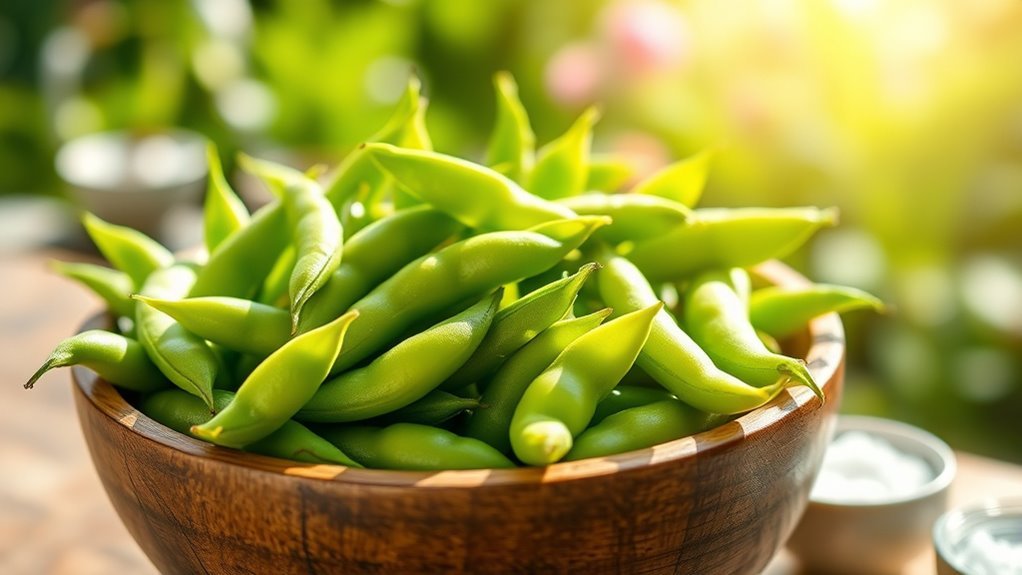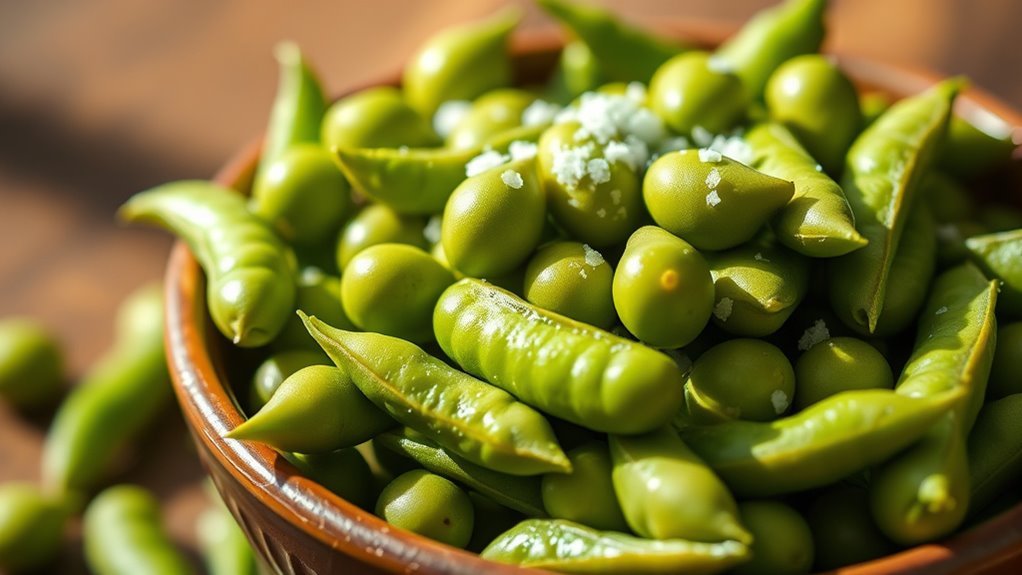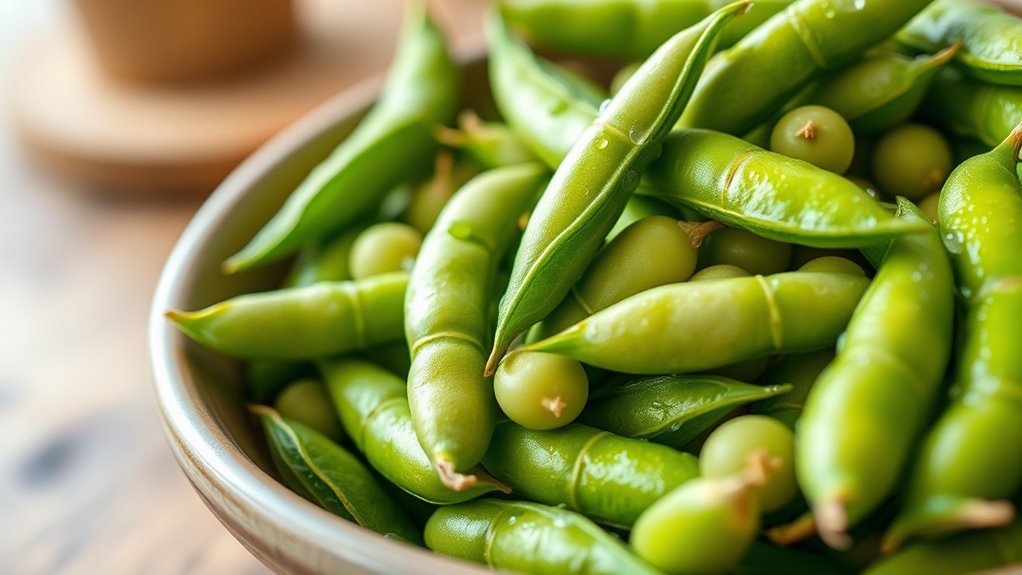Yes, edamame can be keto-approved in moderation. With about 14 grams of total carbs and 6 grams of net carbs per cup, it fits within a keto diet when portion control is exercised. It also offers protein, fiber, and essential nutrients, making it a healthy snack option. To enjoy edamame while staying on track, consider various preparation methods and combinations. There’s plenty more about how to incorporate this nutritious food into your diet.
Understanding Edamame: What Is It?

Edamame, those vibrant green soybeans often served as a tasty appetizer in Japanese cuisine, are young soybeans harvested before they fully ripen. Their origins trace back to East Asia, where they’ve been enjoyed for centuries, often celebrated for their versatility and flavor. You’ll find various edamame varieties, including the popular ‘Mashed Edamame’ and ‘Midori Giant,’ each offering unique textures and tastes. These beans are typically boiled or steamed, making them a delightful snack or ingredient in salads and stir-fries. As you explore these soybeans, you’ll appreciate their rich history and diversity, allowing you to enjoy a culinary experience that connects you to both tradition and innovation. Embracing edamame can enhance your meals while discovering its cultural significance.
Nutritional Profile of Edamame

When considering the nutritional profile of these young soybeans, you’ll find they pack a punch regarding both macronutrients and micronutrients. Edamame varieties, such as fresh or frozen, are rich in protein, fiber, and healthy fats, making them a satisfying snack or side dish. One cup of cooked edamame contains about 17 grams of protein and 8 grams of fiber, contributing to satiety and muscle maintenance. Additionally, they provide essential vitamins and minerals like vitamin K, folate, and magnesium. Different cooking methods, like steaming or boiling, can help retain their nutrients while enhancing flavor. Regardless of how you prepare them, edamame remains a nutritious choice that aligns with a balanced diet, offering freedom in your dietary options.
Carb Content: Is Edamame Keto-Friendly?

When you’re following a keto diet, the carb content of foods is essential for staying within your limits. Edamame, while nutritious, does contain a moderate amount of carbohydrates that you should consider. Let’s explore whether its carb count makes it compatible with your keto lifestyle.
Edamame Carb Count
If you’re considering adding edamame to your keto diet, it’s essential to look closely at its carb content. Edamame can be a delicious option, but you need to be mindful of the carbs. Here’s a quick breakdown of its nutritional value:
| Serving Size | Total Carbs | Net Carbs |
|---|---|---|
| 1 cup | 14g | 6g |
| ½ cup | 7g | 3g |
| 100g | 9g | 5g |
| 1 oz | 4g | 2g |
| ¼ cup | 4g | 2g |
Incorporating edamame recipes into your meals or enjoying it as edamame snacks can provide you with protein while keeping carbs in check. Just remember to monitor your portions!
Keto Diet Compatibility
While edamame can be a tasty addition to your meals, its compatibility with a keto diet largely hinges on the total carb content. Each half-cup serving has about 7 grams of carbs, which can fit into your keto meal planning if you manage your daily carb intake. If you’re aiming for a strict keto approach, you’ll need to take this into account alongside other sources of carbohydrates throughout the day.
When looking for snack ideas, edamame can serve as a healthy option, but moderation is key. You might want to enjoy it occasionally rather than regularly. Balancing your carb intake with other low-carb foods will help maintain ketosis while allowing for the occasional enjoyable treat like edamame.
Health Benefits of Edamame
Edamame is packed with nutrients, making it a great addition to your diet. It’s rich in antioxidants that can help combat oxidative stress and may support heart health. By incorporating edamame, you can enjoy these benefits while staying aligned with your health goals.
Nutrient Density Overview
When considering nutrient density, edamame stands out as a powerhouse of health benefits. Packed with protein, vitamins, and minerals, it’s a smart choice for anyone looking to enhance their diet. The high fiber content aids in digestion and promotes nutrient absorption, helping your body make the most of what you eat. With essential nutrients like folate, magnesium, and iron, edamame contributes to overall health, supporting energy levels and metabolic functions. Plus, being low in carbs, it aligns well with ketogenic lifestyles, allowing you to enjoy its benefits without compromising your dietary goals. By incorporating edamame into your meals, you can enjoy a delicious, versatile food that supports your health and wellness journey.
Antioxidant Properties
In addition to its impressive nutrient profile, edamame is also rich in antioxidants, which play an essential role in combating oxidative stress in the body. Antioxidants help neutralize free radicals—unstable molecules that can damage cells and contribute to chronic diseases. By incorporating edamame into your diet, you can enjoy significant antioxidant benefits. Research suggests that the isoflavones and vitamins found in edamame may reduce inflammation and support overall health. This makes it an excellent choice for those seeking to enhance their wellness while enjoying a delicious snack. So, if you’re looking for a plant-based option that packs a punch regarding antioxidants, edamame should definitely be on your radar.
Heart Health Benefits
Although many people enjoy edamame for its taste and versatility, it also offers notable benefits for heart health. This nutrient-rich snack is packed with fiber, protein, and healthy fats, which contribute to cardiovascular benefits. Studies suggest that the high levels of polyunsaturated fats found in edamame can help lower LDL cholesterol, reducing the risk of heart disease. Additionally, the isoflavones present in edamame may improve blood vessel function and decrease inflammation, further supporting heart health. Including edamame in your diet not only satisfies your taste buds but also empowers you to take charge of your well-being. By making small, informed choices like adding edamame, you can enjoy a heart-healthy lifestyle without sacrificing flavor.
How to Incorporate Edamame Into Your Keto Diet
To effectively incorporate edamame into your keto diet, you can explore various preparation methods that enhance its nutritional benefits while keeping carbohydrate intake in check. Here are some ideas for edamame recipes that fit perfectly into your keto meal prep:
Incorporate edamame into your keto diet with these delicious recipes that maximize nutrition and minimize carbs.
- Edamame Salad: Toss shelled edamame with cherry tomatoes, cucumber, and a lemon-olive oil dressing.
- Stir-Fried Edamame: Sauté with garlic and a splash of soy sauce for a quick side dish.
- Edamame Hummus: Blend edamame with tahini, lemon juice, and garlic for a keto-friendly dip.
- Roasted Edamame: Season with sea salt and roast for a crunchy snack alternative.
Alternatives to Edamame for Keto Snacking
Looking for tasty alternatives to edamame for your keto snacking needs? You’ve got plenty of options that fit the bill! Consider snacking on roasted pumpkin seeds or sunflower seeds—they’re rich in healthy fats and low in carbs. Cheese crisps offer a crunchy, satisfying alternative without the carbs, while olives provide a savory, flavorful option packed with healthy fats. If you crave something fresh, cucumber slices with cream cheese can be a revitalizing low carb alternative. Additionally, beef jerky or pork rinds can satisfy those salty cravings. Each of these keto snacks not only keeps your carb count low but also provides essential nutrients, ensuring you stay on track with your diet while enjoying your freedom of choice.
Frequently Asked Questions
Can I Eat Edamame if I’m Allergic to Soy?
If you’re allergic to soy, you should definitely avoid edamame since it’s derived from soybeans. Luckily, there are soy allergy alternatives you can try. Consider using chickpeas, lentils, or green peas as edamame substitutes. These options can provide similar textures and nutritional benefits without triggering your allergy. Always consult with a healthcare professional to guarantee your choices align with your dietary needs and to explore safe alternatives that suit your palate.
Is Frozen Edamame as Nutritious as Fresh?
When it comes to frozen edamame versus fresh, the nutritional value can be surprisingly similar. While fresh edamame may have a slight edge regarding taste and texture, freezing preserves most vitamins and minerals effectively. Studies show that frozen foods can retain nutrients, making them a convenient and nutritious option. So, if you’re looking for flexibility in your diet, frozen edamame is a great choice without sacrificing too much on freshness.
What Is the Best Way to Cook Edamame?
To cook edamame, you might want to try steaming techniques for the best flavor and texture. Simply place the edamame in a steamer basket over boiling water for about 5-7 minutes. Once they’re tender, you can explore various seasoning options like sea salt, garlic powder, or even a squeeze of lemon for a zesty kick. This method preserves nutrients while giving you a delicious, healthy snack that’s easy to enjoy!
Does Edamame Contain Any Gluten?
Imagine you’re at a vibrant market, surrounded by fresh produce, and your eyes land on edamame. You’re curious about its nutrition, especially if you have gluten sensitivity. The good news is, edamame’s naturally gluten-free! It’s packed with protein, fiber, and essential nutrients, making it a great snack without the worry of gluten. So, if you’re avoiding gluten, you can enjoy edamame guilt-free and savor its delicious, nutty flavor.
How Does Edamame Compare to Other Legumes on Keto?
When you compare edamame to other legumes on keto, you’ll find it offers unique nutritional benefits. Edamame has a lower carb content than many beans, making it a more suitable option for your diet. It’s rich in protein and fiber, which can keep you satisfied. While other legumes might have higher carbs, edamame’s balance of nutrients can fit well within your keto lifestyle, providing you with energy without the excess carbs.
Is edamame keto approved?
Yes, edamame can be considered keto-approved in moderation. Edamame, which are young soybeans, are relatively low in carbohydrates compared to other legumes, making them a suitable snack or side dish for those following a ketogenic diet. However, portion control is key, as consuming too much can exceed your daily carb limit.
What is the nutritional content of edamame?
A 1-cup serving of shelled edamame contains approximately 189 calories, 17 grams of protein, 8 grams of carbohydrates, and 4 grams of fiber. This results in a net carb count of about 4 grams per serving, which is relatively low and aligns well with the macronutrient requirements of a ketogenic diet.
How can I incorporate edamame into my keto diet?
You can enjoy edamame steamed and lightly salted as a snack, toss it in salads for added protein, or use it in stir-fries. Just be mindful of your overall carbohydrate intake for the day to ensure it fits within your keto goals.
Are there any potential downsides to eating edamame on a keto diet?
While edamame is low in carbs, it is important to note that it contains phytoestrogens, which may affect hormone levels in some individuals. Additionally, some people may experience digestive discomfort from soy products. It is best to consume edamame in moderation and monitor how your body responds.
Can I eat edamame if I am allergic to soy?
If you have a soy allergy, it is best to avoid edamame, as it is derived from soybeans. Soy allergies can cause serious reactions, and there are many alternative low-carb snacks and vegetables that can be enjoyed on a keto diet without the risk of allergic reactions.
References
- https://www.healthline.com/nutrition/keto-diet-food-list#vegetables
- https://www.ncbi.nlm.nih.gov/pmc/articles/PMC6780530/
- https://www.webmd.com/diet/obesity/what-is-keto-diet
- https://www.mayoclinic.org/healthy-lifestyle/nutrition-and-healthy-eating/expert-answers/keto-diet/faq-20455609
- https://www.eatright.org/health/wellness/preventing-illness/is-the-keto-diet-right-for-you
- https://www.clevelandclinic.org/health/diet-nutrition/keto-diet
- https://www.verywellfit.com/keto-diet-foods-5117710


